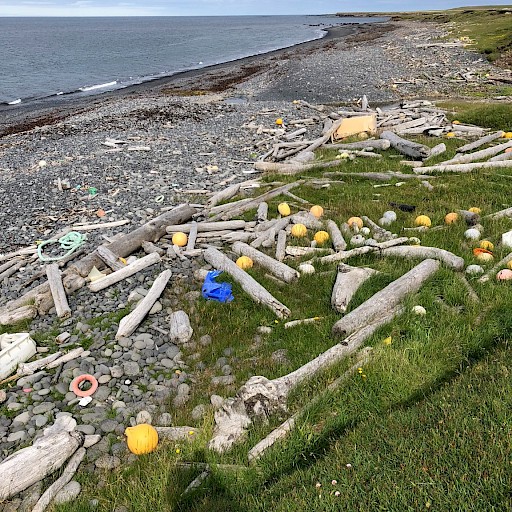OSPAR's Second OSPAR Regional Action Plan (RAP ML 2) sets out the policy context for OSPAR’s work to address marine litter within the North-East Atlantic and directly contributes to delivering the marine litter objectives of the North-East Atlantic Environment Strategy 2030. The RAP ML 2 describes priority thematic areas and defines key actions where the OSPAR Commission can best contribute to tackling this ubiquitous challenge.
You can read the full text of the RAP ML 2 here
Stakeholder engagement consultation responses
Action overview table
Follow the hyperlinks in the table for more information on each of the actions
Action Number | Action Title | Lead & Support | Completion status |
Theme A: Actions to reduce land-based sources of marine litter | |||
Sub theme: Waste prevention and management | |||
A.1.1 | Prevent and reduce plastic waste by coastal municipalities and cities | Germany | In progress |
Sub theme: Wastewater and stormwater management | |||
A.2.1 | Prevent the release of biomedia to the marine and riverine environment | Sweden and France Support from Surfrider | In progress |
A.2.2 | France | In progress | |
Sub theme: Riverine input of marine litter | |||
A.3.1 | France, Belgium, Netherlands Support from Germany, UK and KIMO | In progress | |
Sub theme: Actions to reduce the impacts of specific plastic products and plastic packaging | |||
A.4.1 | France and Seas at Risk Support from Denmark and Netherlands | In progress | |
A.4.2 | Portugal Support from Denmark and Sweden | In progress | |
Sub theme: Land-based sources of microplastics | |||
A.5.1 | Prevent inputs of microplastics from selected land-based sources in the marine environment | Germany Support from Netherlands and Seas At Risk | In progress |
A.5.2 | KIMO and United Kingdom Support from Norway and Sweden | In progress | |
Theme B: Actions to reduce sea-based sources of marine litter | |||
Sub theme: Commercial shipping | |||
B.1.1 | Harmonise practises related to the provision and use of Port Reception Facilities | Belgium Support from Netherlands, Portugal and KIMO | In progress |
B.1.2 | Reduce microplastics from ship greywater discharges | Lead tbc SAR can support | Action pending approval |
Sub theme: Recreational boating | |||
B.2.1 | United Kingdom Support from Belgium, Sweden, the European Boating Industry and the European Boating Association | In progress | |
Sub theme: Microplastics – Sea-based sources | |||
B.3.1 | Identify the need for measures to reduce the unintentional release of microplastics resulting from paint, anti-fouling paint and other marine coatings used by [commercial] marine vessels | Lead tbc | Action pending approval |
Sub theme: Commercial Fishing, Recreational Fishing and Aquaculture | |||
B.4.1 | Prevent, locate, retrieve and handle abandoned, lost or otherwise discarded fishing gear (ALDFG) | Sweden as task manager for phase 1; Germany as task manager for phase 2 with support from Spain, ACOPS, UK and GGGI | In progress |
B.4.2 | Stimulate circular design and developments in waste management of fishing and aquaculture gear | Netherlands and UK Support from Denmark | In progress |
B.4.3 | Belgium, Germany, Netherlands and KIMO Support from Seas at Risk | In progress | |
B.4.4 | Portugal Support from Belgium, Denmark, Germany and Sweden | In progress | |
B.4.5 | Netherlands Support from KIMO | In progress | |
B.4.6 | Spain Support from Portugal | In progress | |
B.4.7 | United Kingdom Support from Norway and Sweden | In progress | |
Sub theme: Litter from offshore industry and activities | |||
B.5.1 | United Kingdom through Offshore Industry Committee (OIC) | In progress | |
B.5.2 | United Kingdom through Offshore Industry Committee (OIC) | In progress | |
Theme C: Cross cutting actions | |||
Sub theme: Cross cutting land and sea based issues | |||
C.1.1 | Prevent microplastic pollution resulting from plastic pellet, powder and flake loss | Netherlands and United Kingdom With support from Denmark, France, Germany, KIMO and Seas at Risk | In progress |
Sub theme: Increasing knowledge and understanding of the marine litter problem | |||
C.2.1 | Portugal and Spain With support from the CleanAtlantic project | Complete | |
Sub theme: Evidence on harm caused by litter to marine species and habitats | |||
C.3.1 | Germany | Complete | |
Sub theme: Increasing integration and connectivity between monitoring, indicators and RAP ML 2 actions | |||
C.4.1 | United Kingdom Support from Denmark, Ireland, Norway and marine litter monitoring expert group leads | In progress | |

